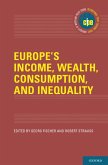European integration is focused on improving economic performance and increasing income levels in nations across the European Union. Political leaders and the media often use income trends to measure this progress, with inequality moving more and more to the forefront of these conversations. In this book, contributing authors focus on the economies within the EU, its member countries, and other European countries closely associated with the EU. The book includes an overview of economic and social trends, using long-term processes of European integration as a way to frame the discussions. Georg Fischer, Robert Strauss, and their contributors focus on explaining how policy makers and the media focus on national trends to measure progress among the nations in Europe. They make a specific point to look at the EU as an economic and political entity whose parts are closely interlinked rather than as a conglomerate of individual countries. The contributors consider the commonalities and differences between various institutions and policies, explaining how a decision in one country might impact another.
Europe's Income, Wealth, Consumption, and Inequality offers a novel approach to the analysis of social and economic trends, and the resulting book identifies major policy challenges applicable in the EU and beyond.
Dieser Download kann aus rechtlichen Gründen nur mit Rechnungsadresse in A, B, BG, CY, CZ, D, DK, EW, E, FIN, F, GR, HR, H, IRL, I, LT, L, LR, M, NL, PL, P, R, S, SLO, SK ausgeliefert werden.









